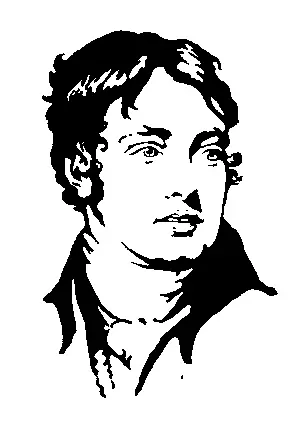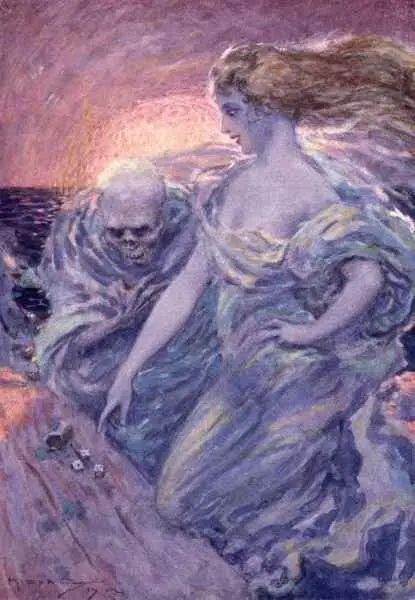Of all Mr. Coleridge's productions, the Ancient Mariner is the only one that we could with confidence put into any person's hands, on whom we wished to impress a favourable idea of his extraordinary powers. Let whatever other objections be made to it, it is unquestionably a work of genius—of wild, irregular, overwhelming imagination, and has that rich, varied movement in the verse, which gives a distant idea of the lofty or changeful tones of Mr. Coleridge's voice. In the Christobel , there is one splendid passage on divided friendship. The Translation of Schiller's Wallenstein is also a masterly production in its kind, faithful and spirited. Among his smaller pieces there are occasional bursts of pathos and fancy, equal to what we might expect from him; but these form the exception, and not the rule. Such, for instance, is his affecting Sonnet to the author of the Robbers.
Schiller! that hour I would have wish'd to die,
If through the shudd'ring midnight I had sent
From the dark dungeon of the tower time-rent,
That fearful voice, a famish'd father's cry—
That in no after-moment aught less vast
Might stamp me mortal! A triumphant shout
Black horror scream'd, and all her goblin rout
From the more with'ring scene diminish'd pass'd.
Ah! Bard tremendous in sublimity!
Could I behold thee in thy loftier mood,
Wand'ring at eve, with finely frenzied eye,
Beneath some vast old tempest-swinging wood!
Awhile, with mute awe gazing, I would brood,
Then weep aloud in a wild ecstasy."
His Tragedy, entitled Remorse , is full of beautiful and striking passages, but it does not place the author in the first rank of dramatic writers. But if Mr. Coleridge's works do not place him in that rank, they injure instead of conveying a just idea of the man, for he himself is certainly in the first class of general intellect.
If our author's poetry is inferior to his conversation, his prose is utterly abortive. Hardly a gleam is to be found in it of the brilliancy and richness of those stores of thought and language that he pours out incessantly, when they are lost like drops of water in the ground. The principal work, in which he has attempted to embody his general views of things, is the Friend, of which, though it contains some noble passages and fine trains of thought, prolixity and obscurity are the most frequent characteristics.
No two persons can be conceived more opposite in character or genius than the subject of the present and of the preceding sketch. Mr. Godwin, with less natural capacity, and with fewer acquired advantages, by concentrating his mind on some given object, and doing what he had to do with all his might, has accomplished much, and will leave more than one monument of a powerful intellect behind him; Mr. Coleridge, by dissipating his, and dallying with every subject by turns, has done little or nothing to justify to the world or to posterity, the high opinion which all who have ever heard him converse, or known him intimately, with one accord entertain of him. Mr. Godwin's faculties have kept house, and plied their task in the work-shop of the brain, diligently and effectually: Mr. Coleridge's have gossipped away their time, and gadded about from house to house, as if life's business were to melt the hours in listless talk. Mr. Godwin is intent on a subject, only as it concerns himself and his reputation; he works it out as a matter of duty, and discards from his mind whatever does not forward his main object as impertinent and vain. Mr. Coleridge, on the other hand, delights in nothing but episodes and digressions, neglects whatever he undertakes to perform, and can act only on spontaneous impulses, without object or method. "He cannot be constrained by mastery." While he should be occupied with a given pursuit, he is thinking of a thousand other things; a thousand tastes, a thousand objects tempt him, and distract his mind, which keeps open house, and entertains all comers; and after being fatigued and amused with morning calls from idle visitors, finds the day consumed and its business unconcluded. Mr. Godwin, on the contrary, is somewhat exclusive and unsocial in his habits of mind, entertains no company but what he gives his whole time and attention to, and wisely writes over the doors of his understanding, his fancy, and his senses—"No admittance except on business." He has none of that fastidious refinement and false delicacy, which might lead him to balance between the endless variety of modern attainments. He does not throw away his life (nor a single half-hour of it) in adjusting-the claims of different accomplishments, and in choosing between them or making himself master of them all. He sets about his task, (whatever it may be) and goes through it with spirit and fortitude. He has the happiness to think an author the greatest character in the world, and himself the greatest author in it. Mr. Coleridge, in writing an harmonious stanza, would stop to consider whether there was not more grace and beauty in a Pas de trois , and would not proceed till he had resolved this question by a chain of metaphysical reasoning without end. Not so Mr. Godwin. That is best to him, which he can do best. He does not waste himself in vain aspirations and effeminate sympathies. He is blind, deaf, insensible to all but the trump of Fame. Plays, operas, painting, music, ball-rooms, wealth, fashion, titles, lords, ladies, touch him not—all these are no more to him than to the anchorite in his cell, and he writes on to the end of the chapter, through good report and evil report. Pingo in eternitatem —is his motto. He neither envies nor admires what others are, but is contented to be what he is, and strives to do the utmost he can. Mr. Coleridge has flirted with the Muses as with a set of mistresses: Mr. Godwin has been married twice, to Reason and to Fancy, and has to boast no short-lived progeny by each. So to speak, he has valves belonging to his mind, to regulate the quantity of gas admitted into it, so that like the bare, unsightly, but well-compacted steam-vessel, it cuts its liquid way, and arrives at its promised end: while Mr. Coleridge's bark, "taught with the little nautilus to sail," the sport of every breath, dancing to every wave,
"Youth at its prow, and Pleasure at its helm,"
flutters its gaudy pennons in the air, glitters in the sun, but we wait in vain to hear of its arrival in the destined harbour. Mr. Godwin, with less variety and vividness, with less subtlety and susceptibility both of thought and feeling, has had firmer nerves, a more determined purpose, a more comprehensive grasp of his subject, and the results are as we find them. Each has met with his reward: for justice has, after all, been done to the pretensions of each; and we must, in all cases, use means to ends!
1 Mr. Coleridge named his eldest son (the writer of some beautiful Sonnets) after Hartley, and the second after Berkeley. The third was called Derwent, after the river of that name. Nothing can be more characteristic of his mind than this circumstance. All his ideas indeed are like a river, flowing on for ever, and still murmuring as it flows, discharging its waters and still replenished—
"And so by many winding nooks it strays,
With willing sport to the wild ocean!"
A Day With Samuel Taylor Coleridge by May Byron
Table of Contents


THE CREW OF THE SKELETON SHIP.
Читать дальше














